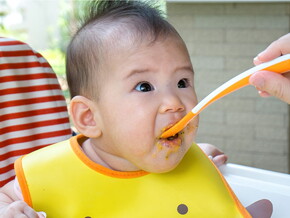
Make Every Bite Count For Baby’s Healthy Growth And Development
Starting your little one on solid foods is quite a milestone! Since his tummy is so small at 6 months of age, he will only be taking small amounts of solid foods. Even these beginning bites are important to his healthy growth and development for he has high needs for nutrition.
Baby-sized tummy
Starting your little one on solid foods is quite a milestone! Since his tummy is so small at 6 months of age, he will only be taking small amounts of solid foods. Yet these beginning bites are important to his healthy growth and development. Even these beginning bites are important to his healthy growth and development for he has high needs for nutrition, but only a small stomach that may be filled quickly.
Babies have different nutritional needs than older children and adults
Considering your baby’s weight and comparing it to that of an older child’s or adult’s, he has higher needs for several nutrients, especially minerals and vitamins. At about six months, the iron stores your baby was born with become low. Iron-fortified infant cereal or meat are often recommended as one of baby’s first foods because they are rich in iron.
Always double check label of infant cereals - they must be fortified with the daily value of Iron needed by your child. You may also mix infant cereal with savory foods such as meatballs. Include a source of Vitamin C, like citrus fruits dalandan, ponkan and calamansi to help increase body’s absorption of iron. A variety of iron-rich foods like chicken liver, beans, and talbos ng kamote also provides your baby’s daily requirement of iron.
Variety is important
Expand your baby’s choices gradually with iron-fortified cereal, mashed or strained fruits like banana or mangoes, and veggies such as cooked kamote or carrots. Introduce one new food at a time. Wait for at least a week before you add a new food to ensure that baby does not give a negative reaction. Your baby learns which food she enjoys and which ones she dislikes. Always good to expose your baby to a wide variety of food.
Protein is important for growth, health, and so much more
By 6 months, your baby has likely doubled his birth weight. By his first birthday, he will have tripled his birth weight, and increased his height by half. This first year will be the fastest growth of his life. Protein is very important for your baby, the key nutrient for his healthy growth and brain development.
Protein also plays an important role in making both digestive and immune systems healthy. Scientific researches show that the levels of protein may also help kids achieve a healthy weight.
Solid foods are needed
By about 6 months of age, introduction of nutrient-rich solid food is important for these reasons:
- Provides a source of nutrients your baby requires
- Teaches baby to eat from a spoon.
- Introduces baby to flavors and textures that help him accept new nutritious foods
Delayed introduction of solid foods may increase the risk of food allergy or eczema. Ask your health care provider when an initial taste of allergenic complementary foods can be introduced to your baby
Make every bite count
When selecting foods for your baby, remember that his stomach is small. He has little room for foods that don’t provide necessary nutrients. If you offer him sweetened foods or beverages, his tummy may fill up on those foods and he will no longer have room for the nutrient-rich foods that he needs.
As he becomes familiar with a variety of tastes and textures, and as he gets closer to a year of age, he will be eating more solid foods. His daily intake should include fruits, vegetables, meats and grains, in addition to breastmilk.
Co-written with Kate Perales, RND
References :
Pan American Health Organizatin (PAHO). Guiding principles for complementary feeding of the breastfed child. World Health Organization, 2003.
American Academy of Pediatrics (AAP). Bright futures nutrition, 2nd ed. Elk Grove Village, IL: American Academy of Pediatrics, 2011.
Related articles


















